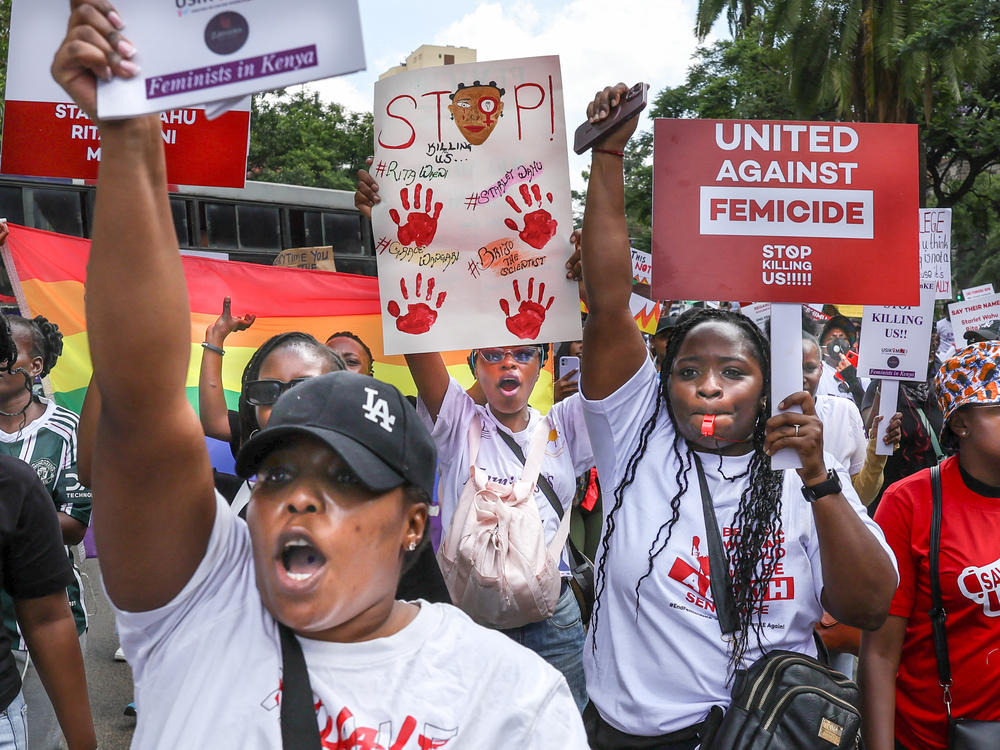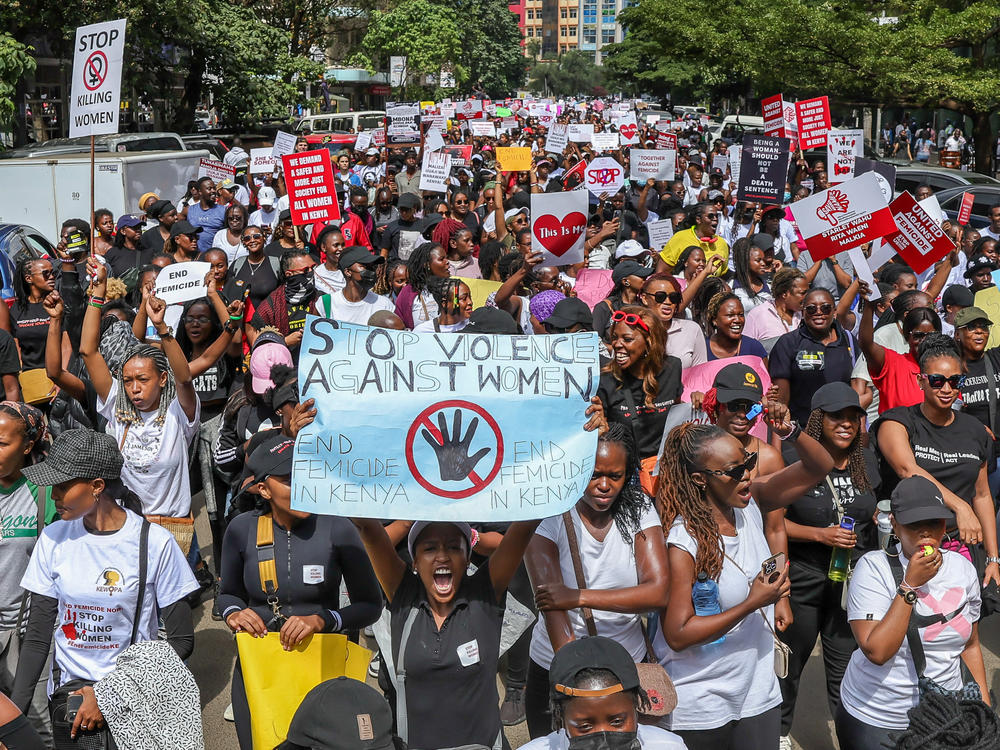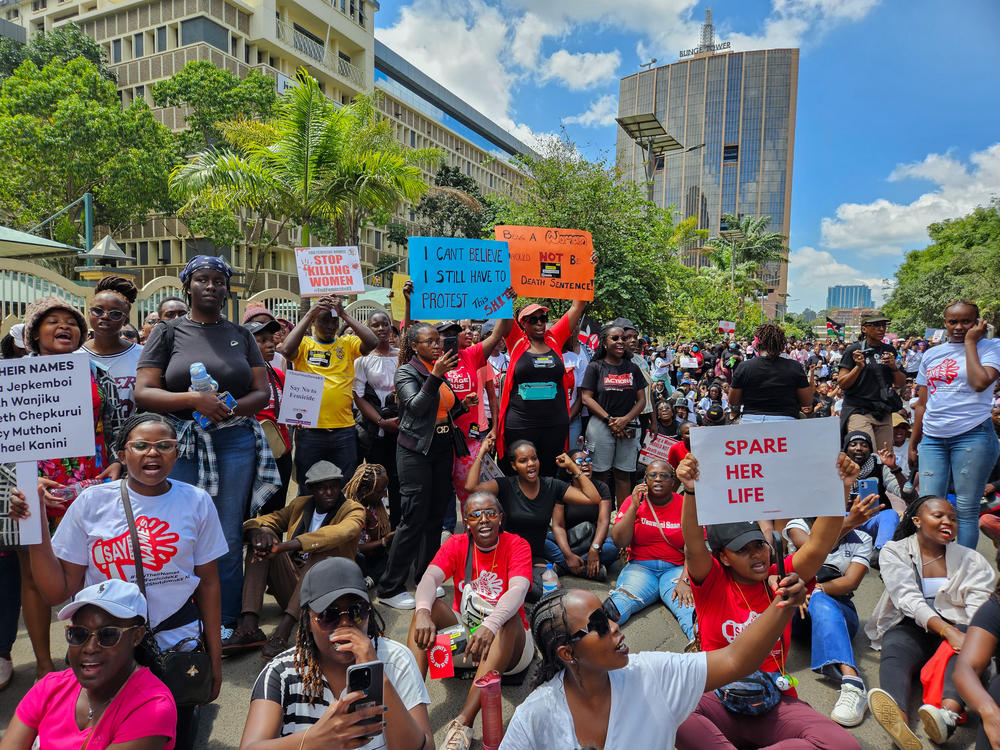Section Branding
Header Content
Murders of women in Kenya lead to a public outcry for a law on femicide
Primary Content
Content Warning: The following story references graphic violence and descriptions of murder.
Hashtags like #WeAreNotSafe, #StopKillingWomen and #EndFemicideKE are trending in Kenya.
They reflect an intense national debate over a series of murders that have rocked the country. In the month of January, 30 women were murdered, according to data compiled by the grassroots organization Usikimye (Swahili for "don't be silent"), whose mission is to end gender-based violence, working with other feminist and human rights groups.
The Kenya Police Service does not track murders by gender.
Usikimye and its partners said they have verified cases with relatives of the deceased and published information online, sometimes naming the women and stating how they believe they were murdered: "stabbed," "beaten," "hit with hammer."
Two of the January murders received widespread attention because the women were murdered in short-term rental accommodations while allegedly on dates. Like many of the January cases, these two murders were marked by brutality.
Police investigators have revealed gruesome details of these and other cases, citing strangulation, deep cuts, decapitations, dismemberment and victims' breasts being cut off.
Njeri Migwi, the executive director of Usikimye, which is one of several organizations spearheading efforts for reform, suspects that the actual number of murders is higher than what has been verified or reported in the media. She believes some cases go unreported.
According to Stephen Muite, a cultural and gender researcher at Nairobi's Kenyatta University, murders sometimes go unreported when the suspected murderer is the victim's spouse.
Africa Data Hub examined available records for women who were murdered in Kenya between 2016 and 2023 and found that in two-thirds of cases, the perpetrator was a partner they currently or previously were intimate with; husbands were the main culprits, followed by boyfriends.
"In Kenya, you find that marriage is an institution that is private. You will find that [a woman] can be killed by her husband, and a clan wants to solve this issue at a family level," Muite says, rather than pursuing legal action. That may mean approaching a religious or community leader for their advice on how to resolve the matter, which may include requiring the perpetrator to compensate the victim's family.
Asking for a legal charge for 'femicide'
A key demand from the protesters: the establishment of "femicide" as a separate legal charge from homicide. That was one of the calls in nationwide marches on January 27 to demand action, with an estimated 20,000 Kenyans participating.
It's a topic that Morris Tidball-Binz has investigated as the author of a report presented to the U.N. General Assembly last year.
"The definition of femicide is pretty straightforward and simple," says Tidball-Binz, a physician who specializes in forensic science and human rights. "It is the killing of women and girls because they're women."
According to the United Nations: "Gender-related killings (femicide/feminicide) are the most brutal and extreme manifestation of violence against women and girls. Defined as an intentional killing with a gender-related motivation, femicide may be driven by stereotyped gender roles, discrimination towards women and girls, unequal power relations between women and men, or harmful social norms."
In Kenya, over 270 local groups, including community-based organizations, youth advocacy groups and legal clinics, have signed a statement asking the government to introduce femicide as a legal charge. Their rationale is that taking this step will acknowledge "the distinct and misogynistic nature" of these crimes and bring increased awareness to gender-based killings, particularly given a landscape they say is prone to victim-shaming.
This effort in Kenya comes after at least 16 countries have enacted laws that specify charges for the killings of women.
Costa Rica was the first, introducing a law against femicide in 2007 calling for a prison sentence of 20 to 35 years for perpetrators – almost double the possible length of prison sentences for homicide. The law, however, only applies to victims who are killed by their partner in a conjugal relationship. And according to research published in 2022 in the Minnesota Journal of International Law, laws relating to gender-based and sexual violence in Costa Rica, including femicide, are "implemented incorrectly or not at all."
Tomasz Milej, a professor at Nairobi's Kenyatta University who lectures on the intersection of international law and social issues, believes that if Kenya introduces a femicide charge, it will not deter perpetrators from committing this crime and that the county won't necessarily see a decrease in cases.
Criminals don't sit around calculating possible sentences to decide if a crime is worth it, he told NPR. However, Milej believes introducing femicide as a charge would have other positive social benefits.
"It is a message that legislators convey that [femicide] is serious and this is something we need to address. This message alone is important," he says. "Law enforcement officers will be more keen to protect women, and society will be more alert to such cases — this is the function of criminal law."
"The fact that there is legislation on gender-based violence and femicide is a first step that needs to happen," says Beatriz Nice, the lead for the gender-based violence project at the Wilson Center, a D.C-based think tank. "But it's insufficient. It needs to come accompanied with government training for the health and legal sector for best practices on how to prevent and assess the crime" — instructing detectives how to investigate deaths of women, which are sometimes characterized as suicide or accidental death; stronger efforts to prevent domestic violence; and just compensation for the families of women who are murdered
Protests continue but the government is silent
Those are all goals that the Kenyan protesters support. The petition to the government demands 16 points of action. It asks the government to declare femicide a national crisis, to set up a commission to investigate violence against women, to take decisive action against perpetrators and to guarantee speedy and effective trials of gender-based violence cases.
"This legislation must provide explicit definitions of violence against women and femicide, ensure the inclusion of the crimes of violence against women and femicide into Kenya's Penal Code, and impose severe penalties for perpetrators," the statement reads.
Kenyan President William Ruto has yet to respond to this petition or comment on the murders, even as fellow politicians, including Esther Passaris, the Nairobi County Woman Representative in Parliament, have urged him to speak on the issue. NPR reached out to the president's spokesperson, who did not respond in time for publication.
Passaris herself has been criticized for her weeks of silence following several highly-publicized murders. While the first high-profile murder case occurred on January 3, it wasn't until the march on January 27 that Passaris addressed the issue publicly. But when she attended the demonstration in Nairobi, she was whisked away by her security guards as crowds booed and chanted, "Where were you? What did you do?"
On social media, Passaris wrote that she was involved in planning the march from its inception and stated that she was booed because she was "the available punching bag to let out frustrations and to settle political scores." She did not respond to NPR's request for comment.
"The government is playing deaf. It's like, see no evil, hear no evil, speak no evil," says Migwi of the activist group Usikimye. "Despite a huge march where we spoke with one voice [calling for action], the government hasn't said anything."
A backlash
These activists are now facing a backlash.
On January 26, a small group of women in Nairobi silently demonstrated in the city's downtown, holding signs with various slogans on ending femicide. They met a hostile reception. In a now-viral video, two men approach the demonstrators, yelling that they are fed up with women taking financial advantage of men. They threaten to slash women and encourage one another to kill "as many as you can."
"Men have suffered because of these women ... We are going to kill you ... You women are going to die," the men yell at the peaceful demonstrators.
Tidball-Binz, the author of the U.N. report on femicide, says that "those reactions are part and parcel of the problem. If you didn't have those reactions you wouldn't need the movement that is underway in Kenya."
Advocates such as Irũngũ Houghton, the executive director of Amnesty International Kenya, have spoken out about what they say is rampant toxic masculinity and misogyny in tabloids and social media which suggest the women were killed because they disrespected and disobeyed men, or were "immoral" — with widespread speculation that some of the murdered women, particularly those who were murdered in short-term rental accommodations, engaged in sex while unmarried, which many Kenyans consider taboo, or may have been sex workers.
Participants in the country-wide protests held signs in response to these sentiments, including one stating: "Every time you blame the victim, you affirm the murderer."
Jacky Habib is a freelance journalist based in Nairobi. She reports on social justice, women's rights and global development. Follow her on X @jackyhabib and read more of her work on her website.



